Jul 12 – 2025. Asia Tour Lecture (4) Taipei, Taiwan
Hello. Today marks the fourth stop of the Asia tour lectures, where Venerable Pomnyun Sunim’s Dharma Q&A is being held in Taipei, the capital and largest city of Taiwan.
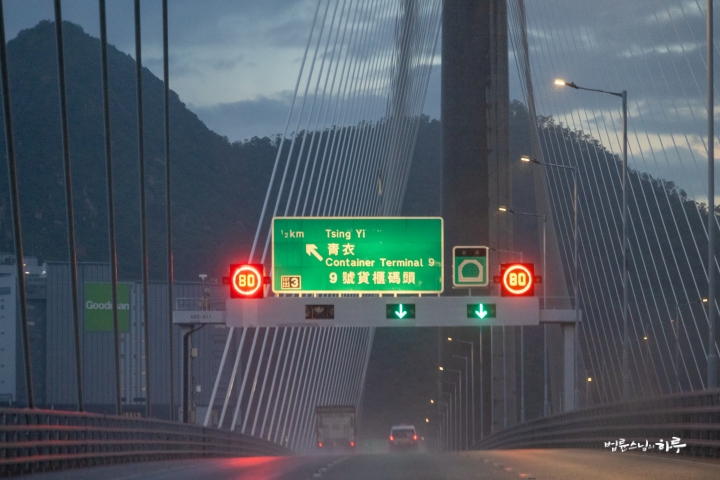
After completing his morning practice and meditation, Sunim left his accommodation at 5:30 AM and headed to Hong Kong International Airport. He arrived at the airport at 6:10 AM and expressed his gratitude to the Jungto Society members who came to see him off.
“Thank you all for your hard work in preparing for the lecture.”
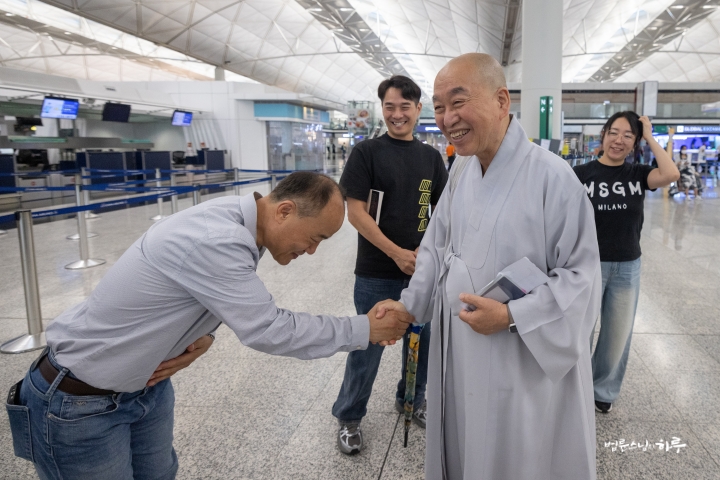
They took a commemorative photo together and promised to meet again.
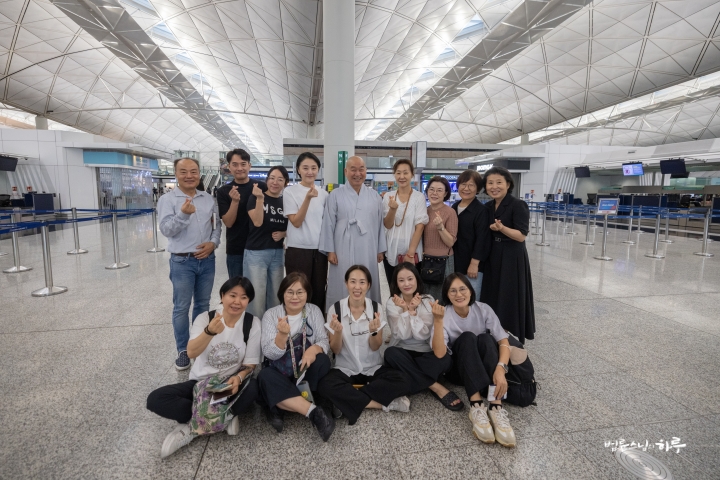
After completing departure procedures, Sunim moved to the boarding gate and boarded the plane. He took a brief rest on the plane.
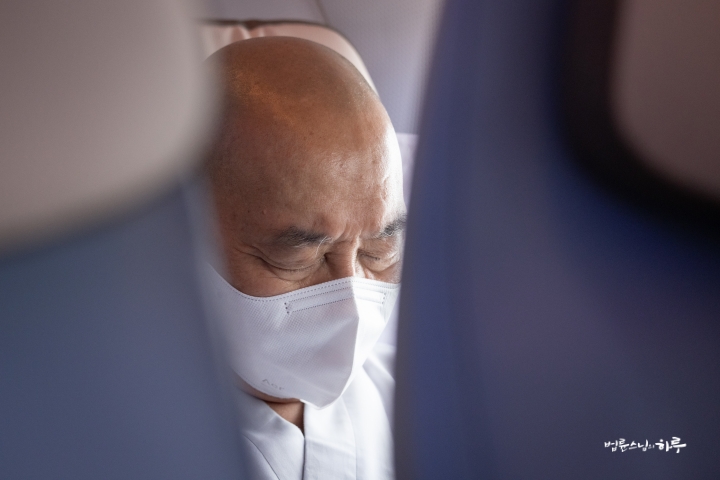
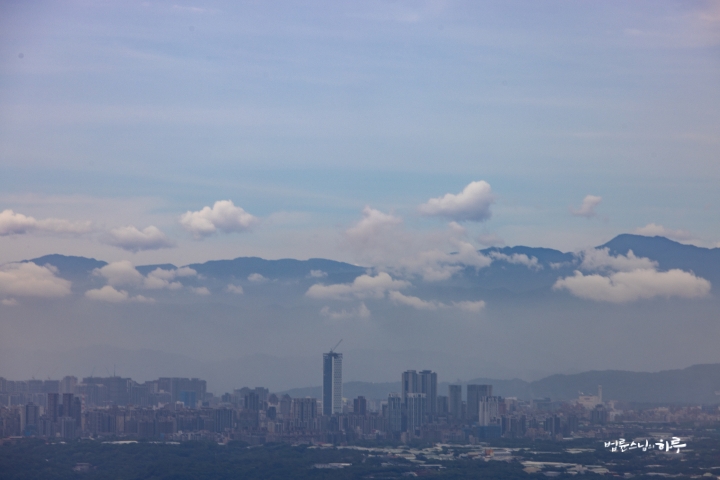
The plane departed from Hong Kong International Airport at 8:10 AM and arrived at Taiwan Taoyuan International Airport at 10:00 AM local time after a 1 hour and 50 minute flight.
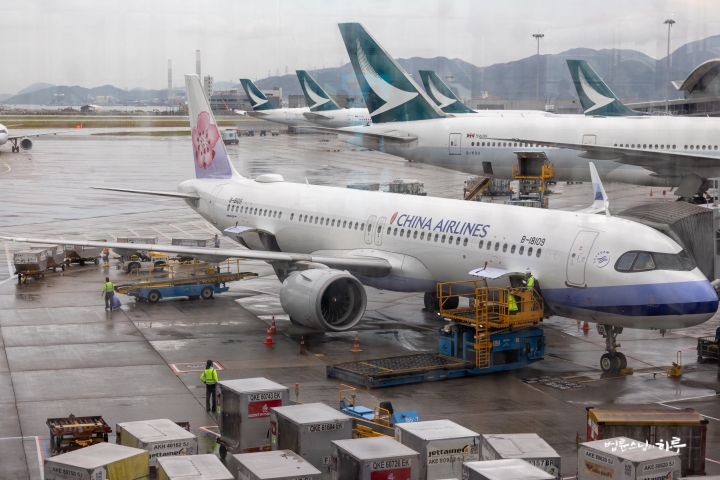
After completing immigration procedures and exiting the arrival hall, Taiwan Jungto Society members welcomed Sunim.
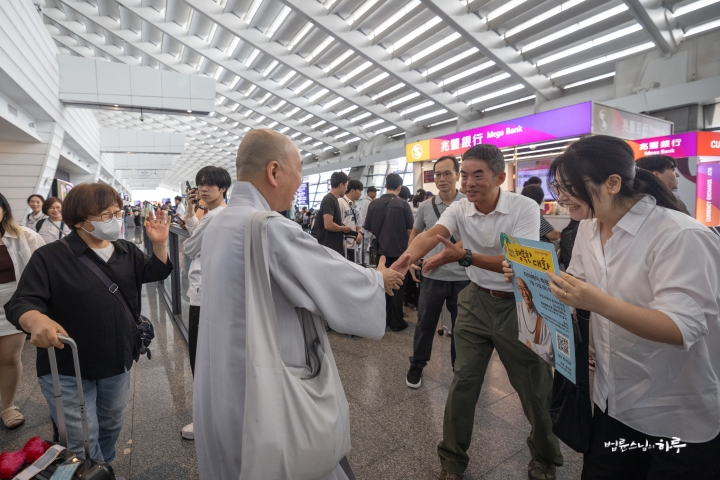
“Sunim, welcome to Taiwan!”
After exchanging warm greetings, they immediately departed from the airport and headed to the accommodation.
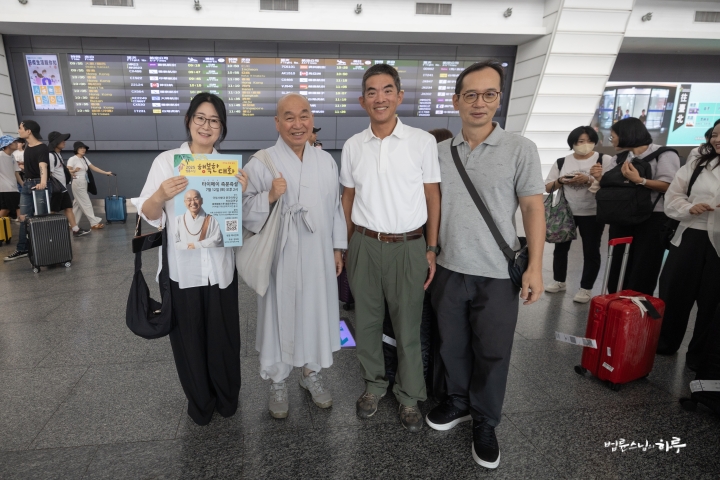
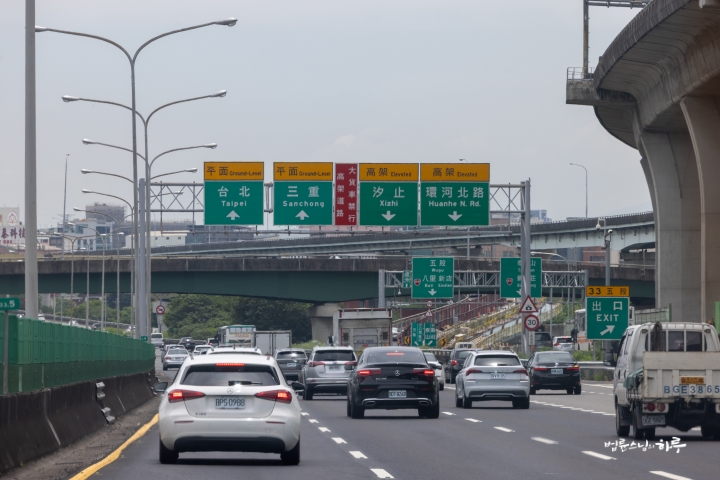
They arrived at the accommodation at 11:45 AM, but since the room would only be available from 3:00 PM, they headed straight to the lecture venue. Today’s lecture is being held in a classroom at the Mandarin Training Center located within National Taiwan Normal University (NTNU).
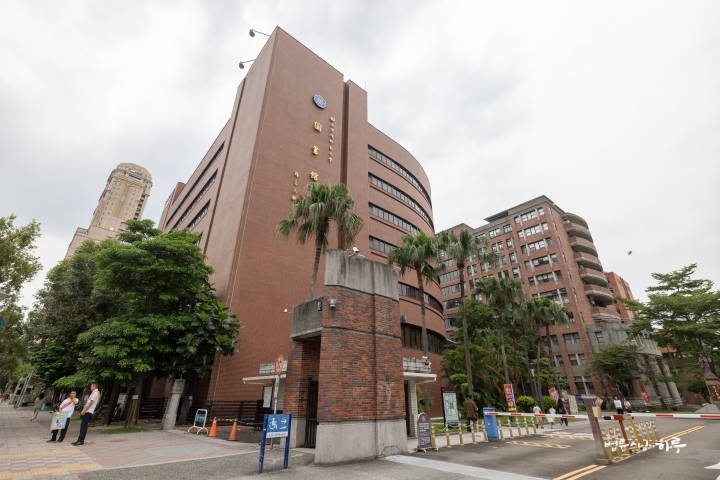
When Sunim arrived, the volunteers who were preparing for the lecture warmly welcomed him.
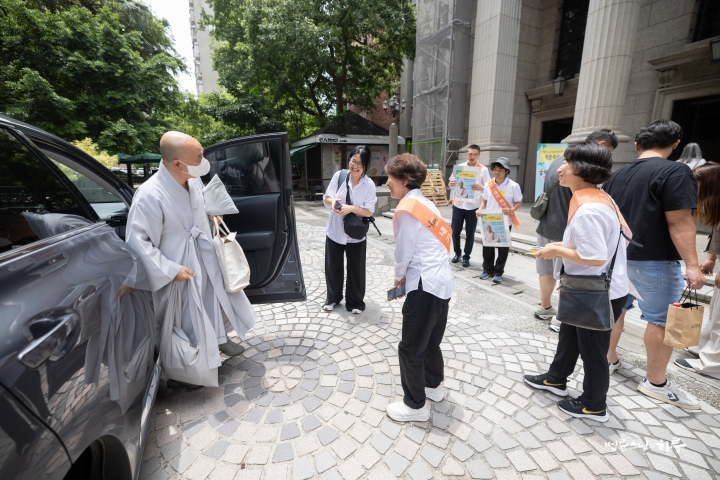
“Sunim, we’ve been waiting for you to come to Taiwan!”
“I see. Have you been well?”
“Yes.”
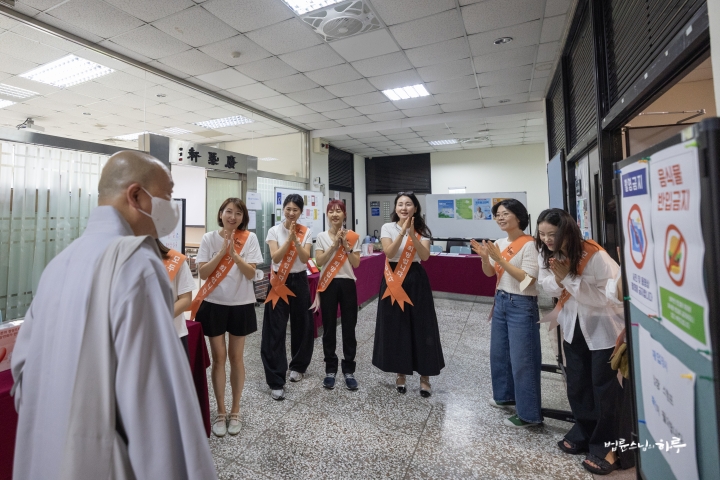
After greeting the volunteers, Sunim toured the lecture venue. Since they had to vacate the hall by 5:20 PM after today’s lecture, they decided to take a commemorative photo with the volunteers first.
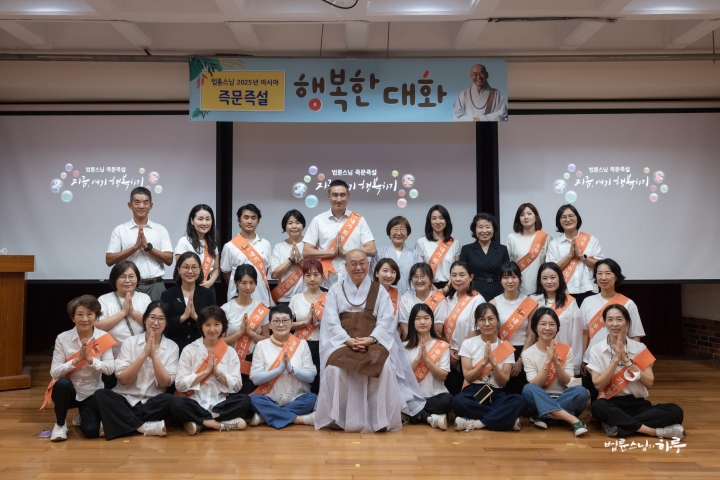
“Taiwan, fighting!”
Sunim had lunch with a packed meal in the classroom across the hall and rested briefly before the lecture.
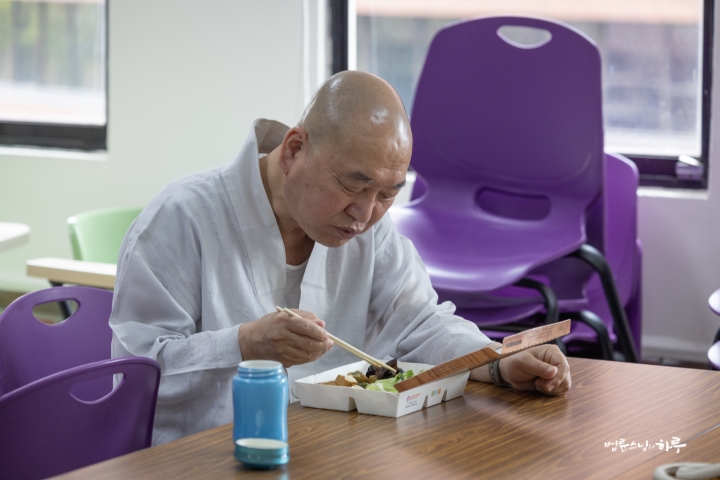
At 2:00 PM, about 120 Korean expatriates gathered in the lecture hall. Since this was the first lecture in 10 years since the 100 World Lectures in 2014, many expatriates rushed to hear Sunim’s words in person after such a long time.
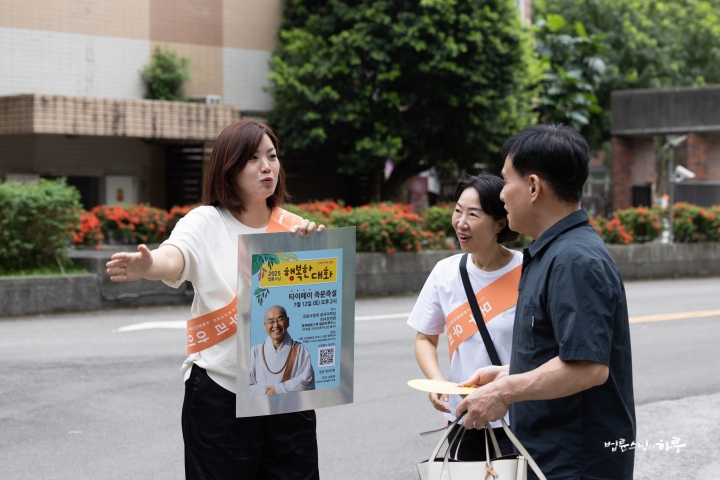
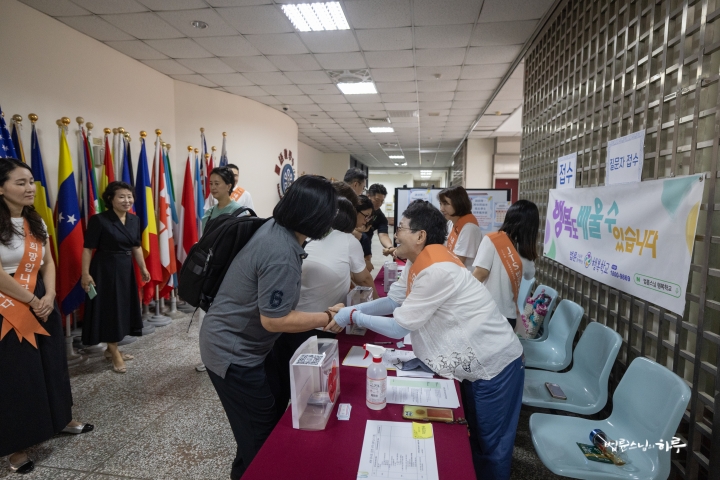
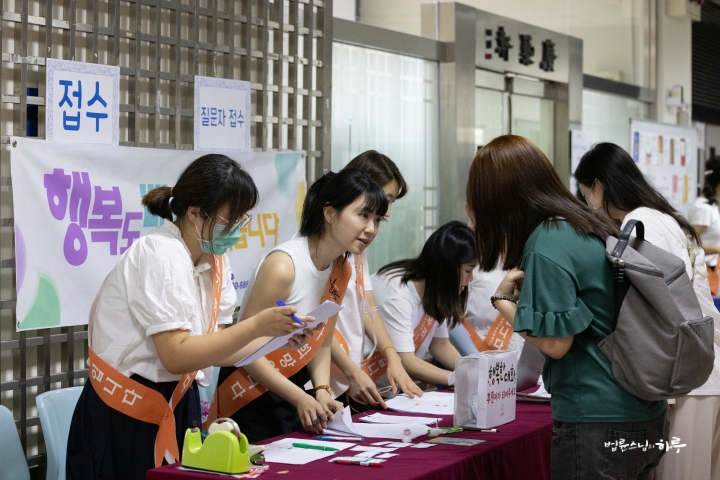
When the introductory video ended, Sunim slowly walked onto the stage. The audience welcomed him with enthusiastic applause and cheers.
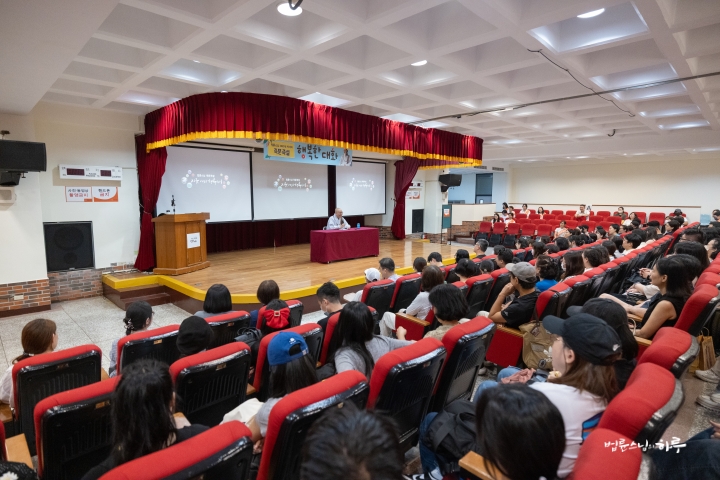
Sunim greeted them with a smile.
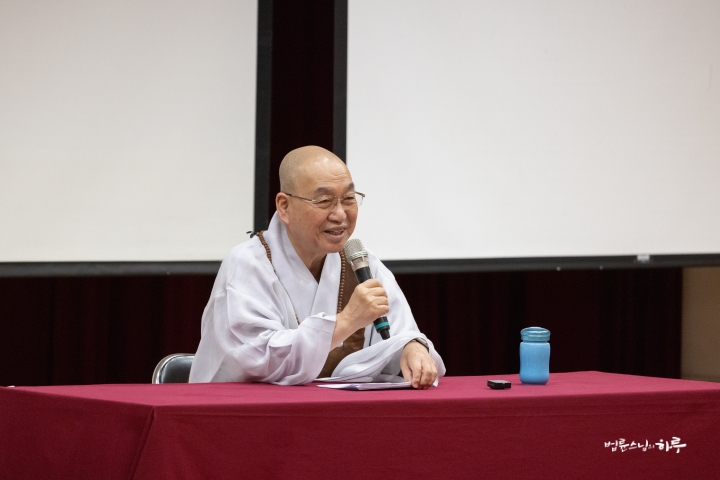
“I think it’s been 10 years since I came to Taiwan. Have you all been well?”
“Yes.”
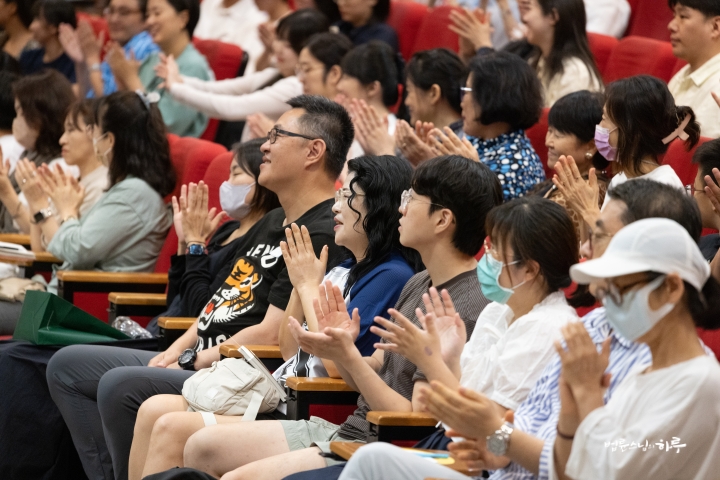
“I came to Taiwan in 2014 during my 100 World Lectures tour. Please raise your hand if you attended the lecture then.”
Only one or two people raised their hands.
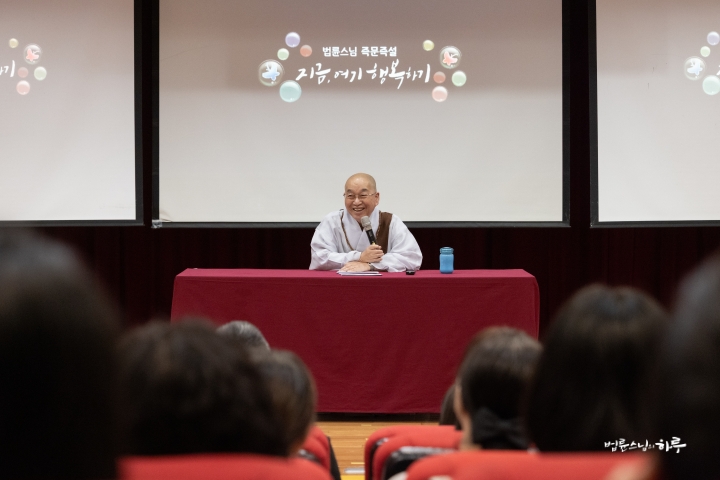
“So everyone is here for the first time. I conduct tour lectures several times a year for overseas Koreans, and I usually visit places with large Korean populations once every two years. I visit the United States annually, both the West Coast like Los Angeles and the East Coast like New York, as well as places like Australia where many Koreans live. However, this is my first visit to Taiwan in 10 years since the 100 World Lectures in 2014. It’s nice to meet you all.”
Those who had submitted questions in advance then raised their hands and had conversations with Sunim. During the two hours, nine people asked Sunim questions. One of them asked for Sunim’s advice, saying her feelings were complicated because her mother in Korea wanted to live together after her father passed away.
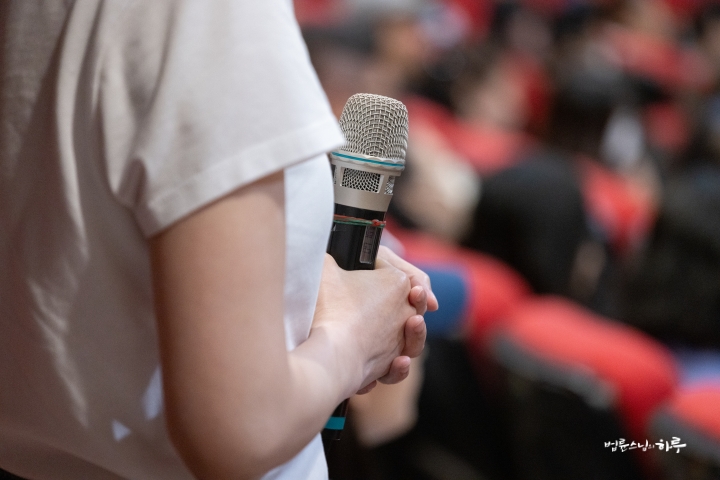
Should I Return to Korea Because My Mother Is Now Alone in Korea Even Though I’ve Settled in Taiwan?
Sunim first asked the audience a question.
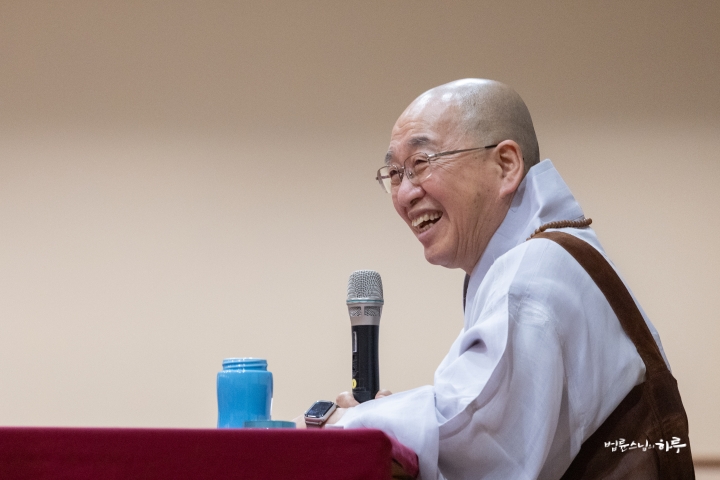
“Do you think this question would be a concern? Or not?”
The audience murmured their responses.
“It seems like it would be.”
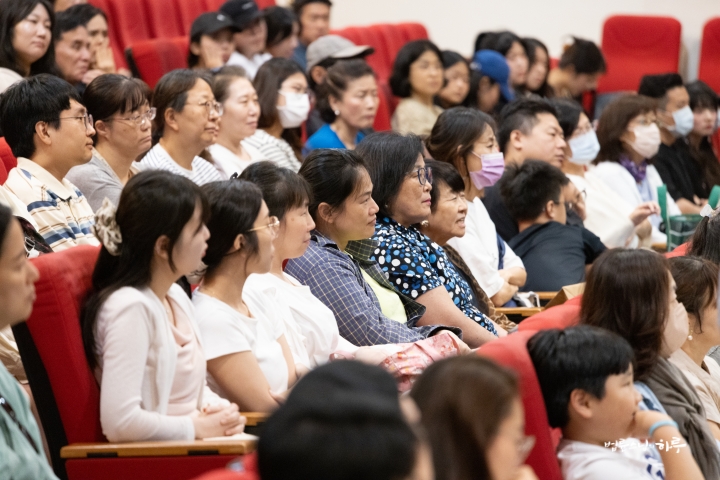
Sunim continued his response.
“I don’t think it would be a concern at all. If it seems like a concern, I think there’s only one reason. If something that shouldn’t be a concern at all becomes a concern, what kind of problem might be causing it?”
The audience murmured various responses again.
“Guilt.”
“The bond between parent and child.”
“Greed.”
Various answers emerged. Sunim continued his response.
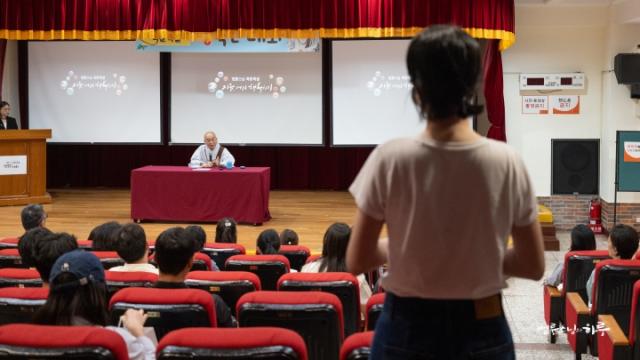
“If it becomes a concern at all, the reason would be that your mother has some assets. I suspect it would only be a concern in such a case. Does your mother have some assets?”
“Yes, she does.” (Laughter)
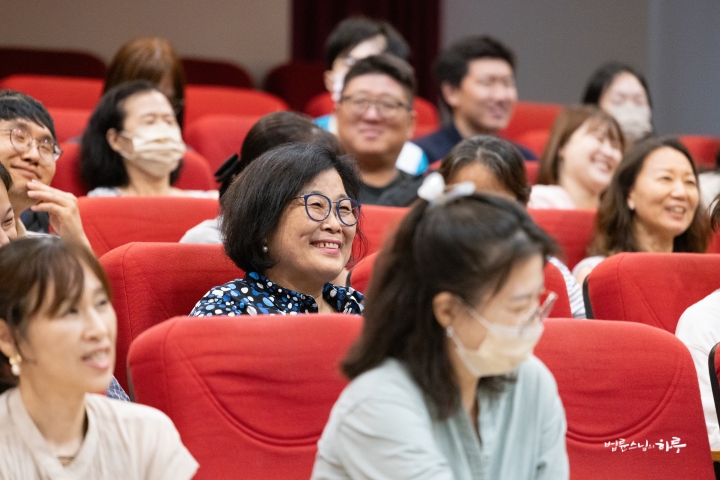
“When you hear the explanation of the situation, you should be able to guess immediately, but you all seem a bit slow. As soon as I heard the question, I guessed, ‘Ah, the parent must have some assets.’ If there were no assets, this couldn’t be a concern. Because you said you didn’t have a good relationship with your parents when you were young. And you said you left home early and lived apart from your parents for a long time. You recently lived together for two months and said the relationship still isn’t good. If the relationship was bad in the past but is very good now, it could be a concern. Moreover, your husband isn’t Korean but Taiwanese, and you’ve already settled in Taiwan. So why would it be a concern? Common sense says it shouldn’t be a concern at all.
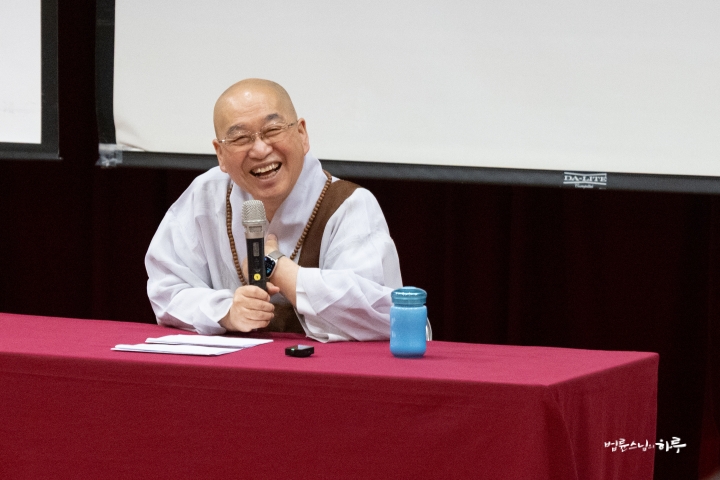
And from the mother’s perspective, it wouldn’t be possible to ask a daughter she doesn’t get along with to live together unless she had some assets to offer. It’s because she has assets that she’s thinking, ‘If you come to Korea and take care of me and live with me, I’ll give you all these assets.’ That’s why the mother made the proposal.
For you, guilt, the parent-child bond, and all the things others have mentioned certainly play a role, but those aren’t the core issue. The core issue is that your mother has assets. You’re thinking, ‘No matter how much I earn working abroad, it won’t be much, but if I go back to Korea and take care of my mother a bit, I might actually inherit more assets.’ Of course, I’m not saying you’re deliberately calculating this. The reason you’re conflicted is because these thoughts are operating in your subconscious.”
“My younger sister is in Korea. I have no complaints about my parents doing whatever they want with their assets, and since my sister is there, they can give everything to her. My sister has been by their side for a long time. I can continue living in Taiwan without any complaints. However, my sister also doesn’t like our parents because of their strong personalities, but she stays nearby out of necessity and does what needs to be done. My sister also tells me, ‘You’ve been living your life doing whatever you wanted until now, so shouldn’t you come back to Korea and fulfill your duties as a daughter?’ My aunts also take turns calling me, saying I should come back to Korea and take care of my mother. Rather than wanting to receive my mother’s assets, I’m conflicted because I keep hearing these things from people around me.”
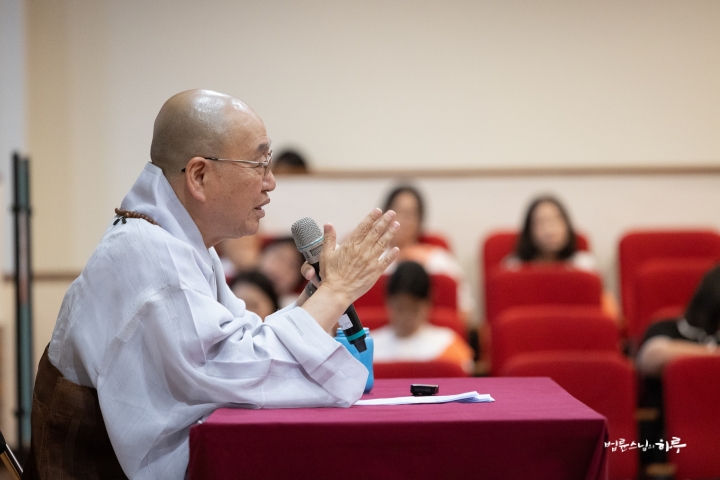
“That’s exactly where you’re mistaken. You don’t understand your own mind. For example, let’s say my parents suggested that I stop being a monk and get married. They might say, ‘It’s fine to live alone when you’re young, but you need a companion when you’re old. You’re fine living alone now because you’re young, but you’ll be lonely when you’re old.’ They try to persuade me with all kinds of arguments. If I start wondering ‘Should I get married or not?’ after hearing such talk, is it because of what they said? Or is it because deep in my heart, I already have thoughts like ‘Maybe I should try getting married’? Do I become conflicted because people keep talking about it even though I have absolutely no intention of getting married? What do you think?”
“I become conflicted because I have those thoughts within me.”
“Would I become conflicted just because people keep talking about it when I have no thoughts about it myself? When someone says something, it’s merely providing a stimulus. When that stimulus becomes a source of anguish for me, it means there’s already a reason within my mind.
Let me give you another example. Let’s say I want to marry a certain man, but my parents keep opposing it. If I start having doubts about the marriage because of my parents’ opposition, it means I already felt something was lacking in that man before they opposed it. I’m conflicted because there’s something I don’t like about him in my heart.
If you feel guilty because you’ve lived apart from your parents for a long time and various reasons come to mind, those are indeed reasons for your conflict. However, if you think those are the reasons you’re conflicted, then you don’t accurately know yourself. Your mother, who didn’t treat you well when you were young and isn’t affectionate now, can make such a proposal because she has some assets. It’s not easy to call a daughter and say ‘Take care of me’ when you have nothing. She can say such things because she has some assets.
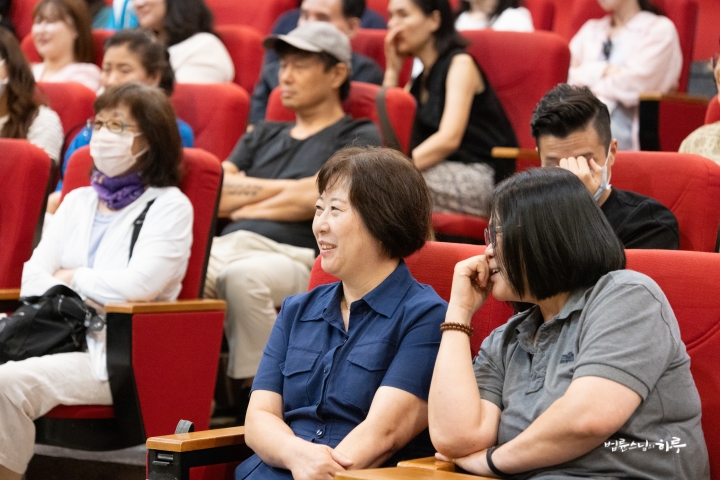
That’s why you need to clarify your position. Let’s say that even if you save diligently from your salary in Taiwan for ten years, you can only save 500 million won. But if you take good care of your mother, you could inherit 2 billion won after she passes away in ten years. The latter is much more economically effective. In that case, you can return to Korea to care for your mother. Don’t think of this as being unfilial. If you go to Korea with this mindset, even if your mother criticizes you, it won’t bother you because you went there to earn money.
Why doesn’t your younger sibling want to do something that’s financially beneficial? Because your mother keeps losing her temper, and no matter how good the money is, they can’t stand her temper. That’s why they’re pushing it onto you. However, if you can overcome such challenges, your share will gradually increase. If you’re clear about this position, no matter how much your mother loses her temper, it won’t be a big problem. But if you return to Korea out of pity for your mother and guilt, when she loses her temper or says things that hurt you as a child, you’ll regret going to Korea. You’ll have thoughts like, ‘Why did I come to Korea? I gave up everything I built in Taiwan to come here, and for what?’
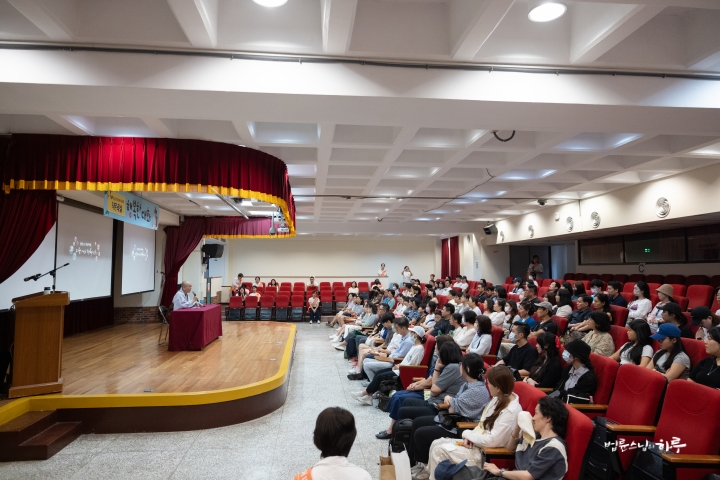
So there’s absolutely nothing to worry about. Just let your mother’s words go in one ear and out the other. Simply think, ‘Mom must be having a hard time living alone,’ or ‘Now that she has some money, she’s trying to control me again.’ Don’t worry about it and just tell her this:
‘I understand, Mother. My husband and children are in Taiwan, so it’s impossible for me to return to Korea. Please don’t even think about it.’
Instead, tell your sibling who lives near your mother, ‘I’m sorry you have to take care of everything alone. I’ve thought about it, and it would be difficult for me to return to Korea. Either you take care of her, or if it’s too hard for you too, just let her live on her own.’ Since your mother has some money, if she can’t rely on her children, she’ll find a boyfriend. Or she’ll hire a housekeeper. So there’s nothing to worry about.
If you have any lingering attachment to your mother’s assets, you need to be clear about that before deciding to return to Korea, so you won’t have regrets later. If that’s not the case, then there’s absolutely no need to worry.
Your mother’s assets belong to her while she’s alive, and she’s free to give them to whomever she chooses. Whether she gives them to a stranger on the street, donates them to a temple or church, gives everything to your sibling, or gives them to whoever takes care of her – that’s her freedom. However, after your mother passes away, since there are two children, the law states that any remaining assets should be divided 50-50. It doesn’t matter whether I took care of mother or my sibling did. So you shouldn’t think, ‘I took care of mother more, so I should get more of the inheritance.’ If mother chooses to leave her assets to you while she’s alive because you took better care of her, that’s her choice. But once mother passes away, the law requires that assets be divided equally among children. It doesn’t matter who cared for her more or less. People feel wronged and resentful about this, but what can we do when that’s how the law works?
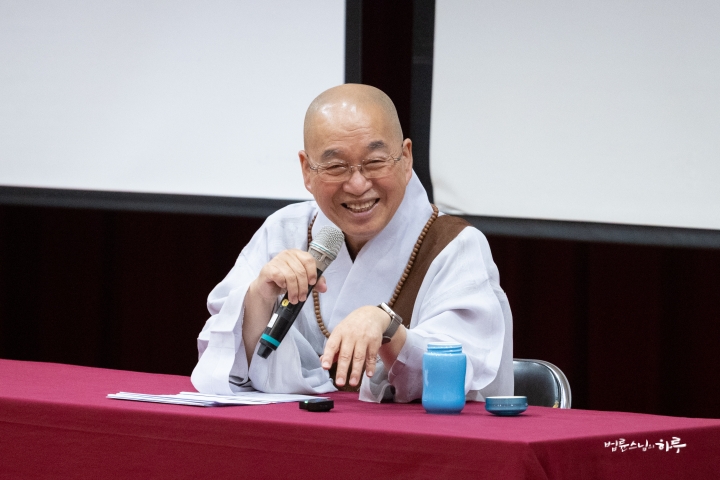
So don’t worry about it anymore. Instead, try to visit your mother a little more often. If you used to visit once a year, try going twice a year from now on, or if you called once a month, try calling every two weeks. Even though you live apart, maintaining the relationship this way is much better than becoming enemies. If you go back to Korea and live with your mother, you’re likely to fight and become enemies. Eventually, you’ll end up returning to Taiwan. Then you won’t be able to secure any inheritance, you’ll uproot what you’ve established in Taiwan, and you’ll end up with nothing. Right now, you’re contemplating whether to eat food that looks good but contains poison. It’s the same as asking, ‘People around me keep telling me to eat it, should I?’
This shouldn’t be a concern at all. Stop thinking about it from today. If it continues to bother you, think ‘It’s because of money.’ After calculating, if it’s profitable, go back to Korea and take care of your mother regardless of what she says. Since it’s profitable, there’s no need for regret. What I want to say is how you’re going to live your life. To avoid regretting your choices, you need to have a clear perspective. That way, you won’t regret your decisions.
If you go back to Korea thinking ‘My mother wants to see me, so…’ without knowing the real reason for your concern, you’ll definitely regret it. Thinking ‘I’m going because my mother wants to see me’ is not the essence. You should think and decide ‘I’m going to Korea because I want to see my mother.’ Only then will you have no regrets. That way, even if problems arise, it’s your responsibility because you wanted to go. But if you think you came because your mother told you to, you’ll resent your mother when difficulties arise later. Eventually, you’ll become enemies with your mother.”
“I understand well. Thank you.”
“We saved someone who was about to take poison and die. The reason I’m talking at length like this is because not only this person but most people don’t know themselves. That’s why they always have regrets. They keep thinking things like ‘I got married because my mother told me to,’ but that’s not actually true. That was just the surrounding circumstances, and the final decision was made by you. You need to have this perspective to take responsibility for your own life.”
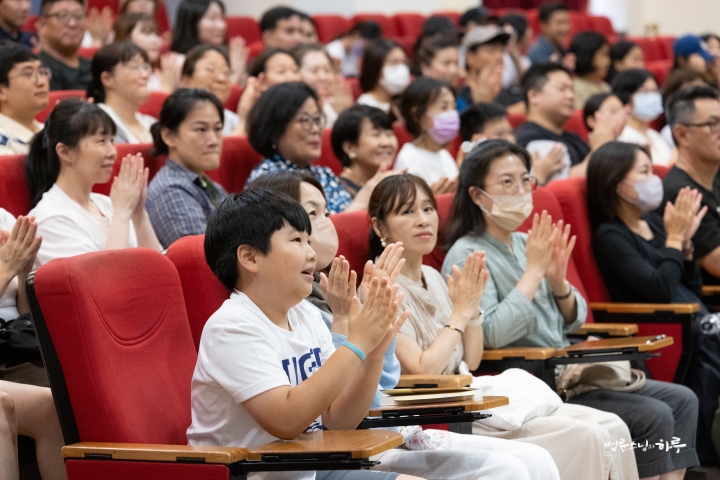
Questions continued to follow.
I can’t control my anger well. How should I manage my mind?
My life goal is to live peacefully and happily, but lately my life feels too monotonous. How can I live happily in the future?
I’m an elementary school student who recently came to Taiwan and can’t speak English well. I’m worried because my friends tease me a lot for being overweight.
I don’t really know what happiness is. Is it happiness if I’m not suffering? Even in happy moments, I think about past suffering.
I see white things floating hazily in my eyes like gnats. I’m anxious because this prevents me from doing what I want to do.
My 4-year-old child’s difficult temperament seems to resemble mine and their father’s. How can I change my child’s difficult temperament?
I’ve been living in Taiwan for 2 years. I came to use my English major, but I only use Chinese, so I’m considering changing jobs. Should I raise objections to the company’s unfair treatment?
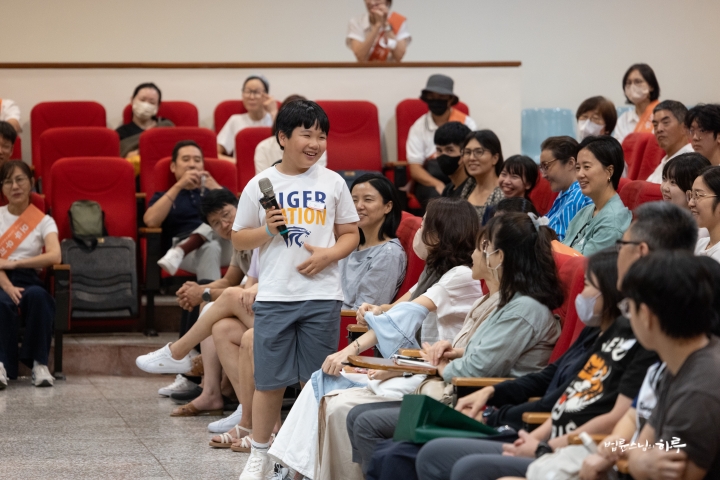
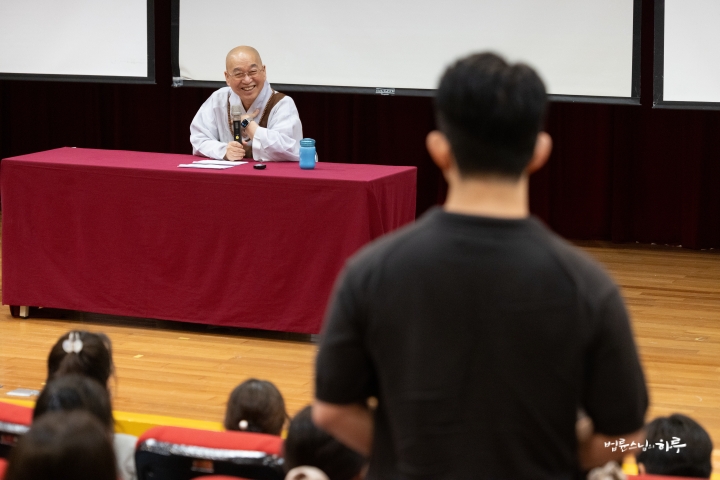
Today, various people asked questions, from elementary school students studying abroad to Korean expatriates and local Taiwanese. Among them was a Taiwanese student from National Taiwan Normal University who frequently watches Venerable Pomnyun Sunim’s YouTube videos. He happened to see a poster and learned about the lecture. He asked his professor for permission, skipped his university class, and attended the Dharma Q&A. Since he really wanted to ask a question, interpretation was provided so he could have a conversation with Sunim.
Although the lecture was scheduled for 1 hour and 30 minutes, 2 hours passed quickly as conversations continued. Regrettably, promising to meet again next time, the lecture ended after 4 PM.
Immediately, a book signing session began on stage. The expatriates who attended the lecture stood in a long line to receive Sunim’s autograph and exchange greetings.
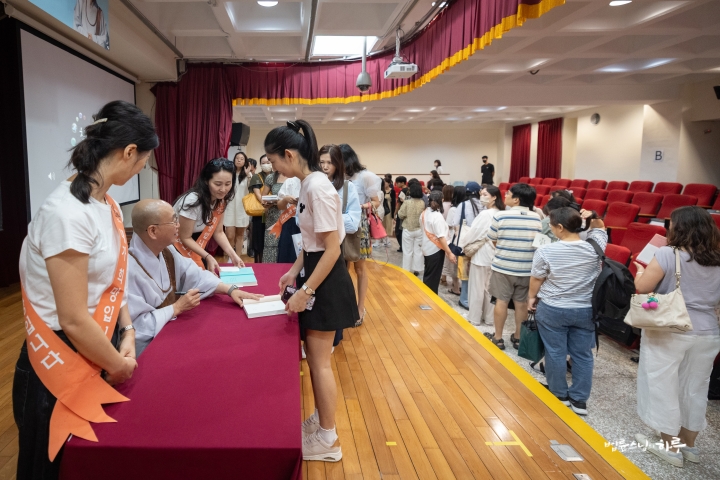
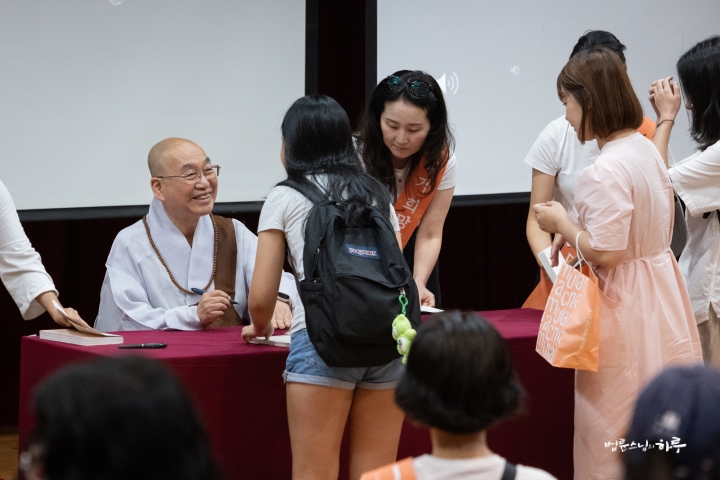
“Thanks to Sunim, I’ve become really happy. Thank you.”
After the book signing session, Sunim expressed gratitude to the volunteers who prepared the lecture and then moved to the accommodation.
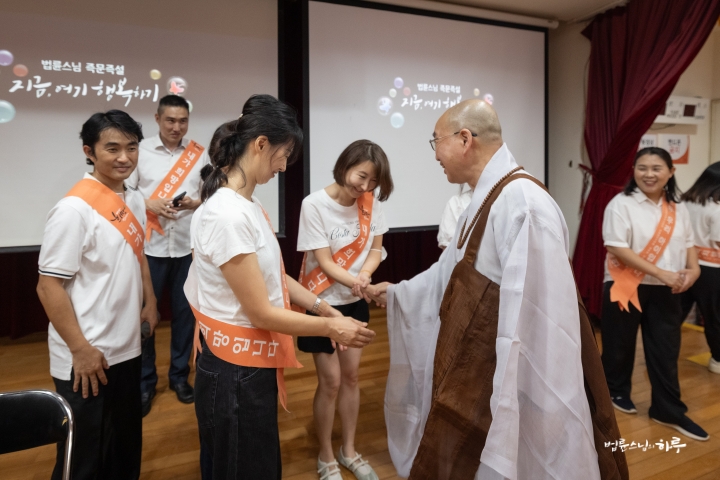
The volunteers sat in a circle with Dharma Teacher Myodeok and had a mindful sharing session.
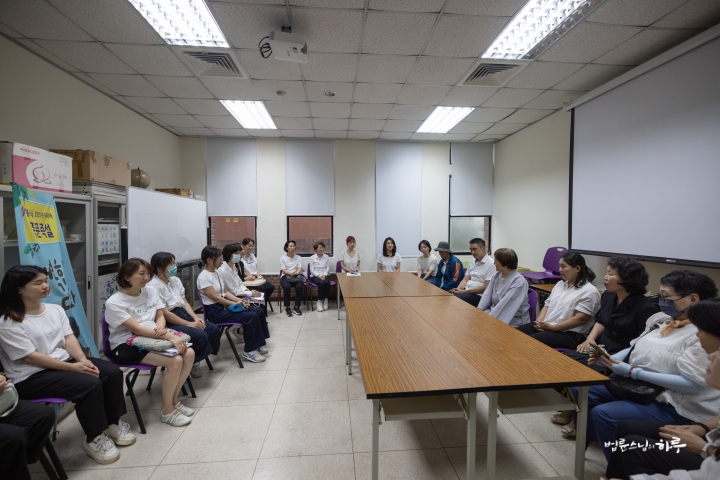
Since there aren’t many Korean expatriates in Taiwan, they said this was the first time so many Koreans had gathered for an event like today. People who had only watched Venerable Pomnyun Sunim’s Dharma Q&A on YouTube were all moved to meet face-to-face and gather in one place.
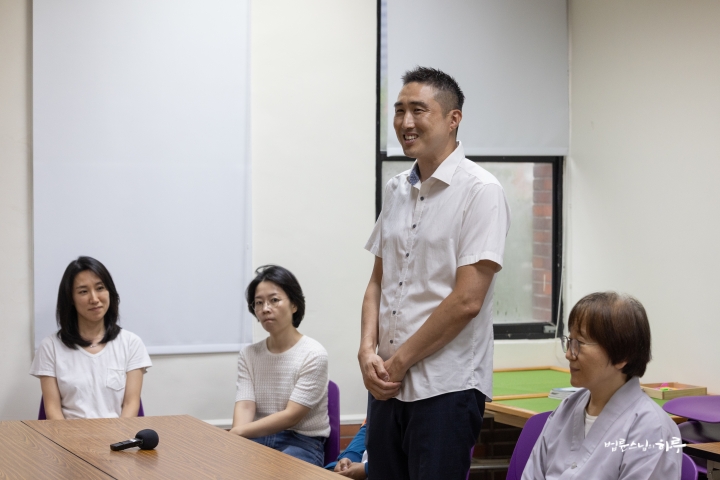
“I’ve been in Taiwan for 28 years, and today is the first time I’ve seen so many Koreans gathered together. Having conversations only in Korean with so many Koreans for such a long time is my first experience in Taiwan. It was such a meaningful day.”
“I applied to volunteer to repay the kindness, as I’ve received a lot of help from listening to Venerable Pomnyun Sunim’s Dharma Q&A. My role was to hold signs and guide people outside. Although my legs hurt, my heart felt proud.”
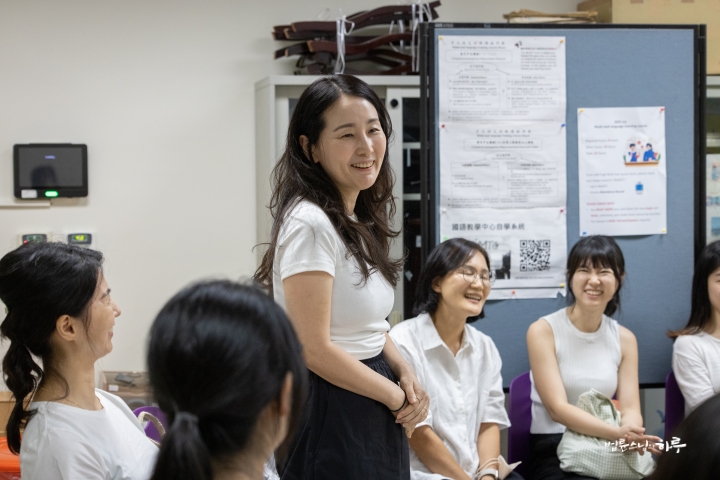
“Venerable Pomnyun Sunim’s Dharma Q&A has been a great comfort to me. Today, all I did was pass the microphone to questioners and turn on the microphone for Sunim to use, but this work was so meaningful in my life. I’ve been in Taiwan for 20 years, and today was the most meaningful day.”
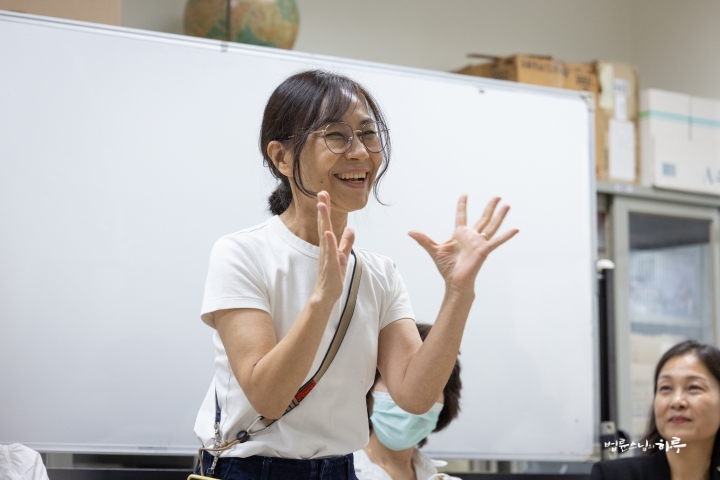
“Everyone has difficult times in life. I survived without dying by listening to Sunim’s Dharma talks, and I never dreamed I would meet Sunim in person today. I volunteered to help so I wouldn’t live a meaningless life like dust, and thanks to this, I’m gaining the strength to live healthily.”
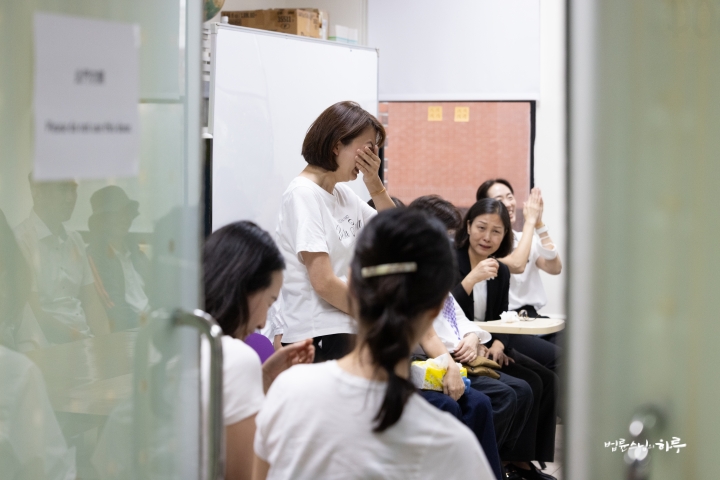
“Today was my first time volunteering since coming to Taiwan. I was so grateful to feel that I can be useful in this world too.”
Many people shed tears during the sharing. They said they received great comfort from today’s lecture after going through difficult times. Yang Eun-mi, who coordinated this Taiwan lecture, also shared her thoughts.
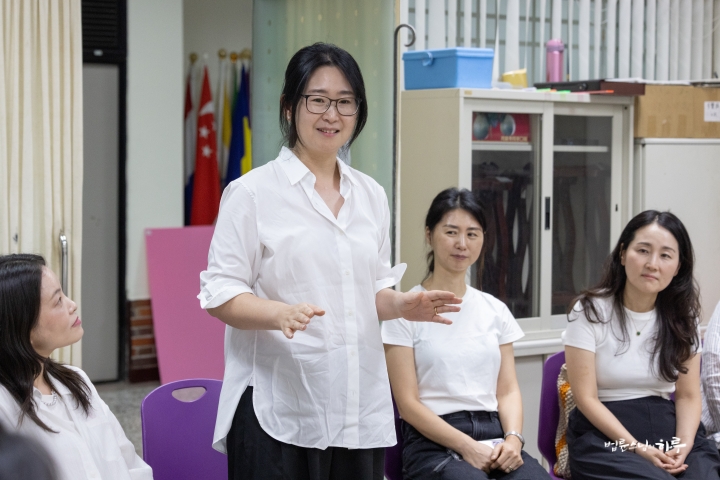
“There are almost no Jungto Society members in Taiwan. So I started preparing for the lecture by contacting acquaintances, but there were many difficulties. While listening to today’s lecture, I thought, ‘After all this hard work, we should have lectures for 5 days instead of just 2 hours.’ But as the venue rental time was running out, I was anxious that we might not finish on time. I had no choice but to prepare the lecture, but I’m so grateful to all of you who chose to be here despite having a choice.”
Finally, Dharma Teacher Myodeok gave encouraging words to those who volunteered despite difficult conditions. The sharing session ended with loud applause, encouraging each other for their hard work.
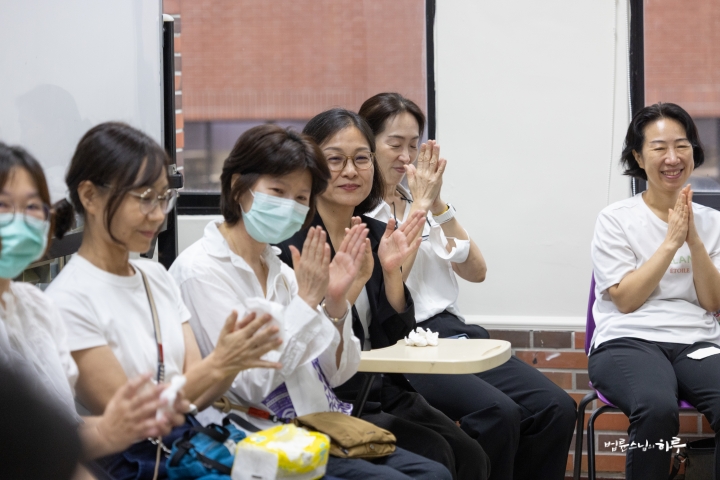
After the sharing session, they moved to a nearby vegetarian restaurant. From 6 PM, Sunim had dinner and an evaluation meeting with the Asia branch support team volunteers who accompanied him on this Asia tour.
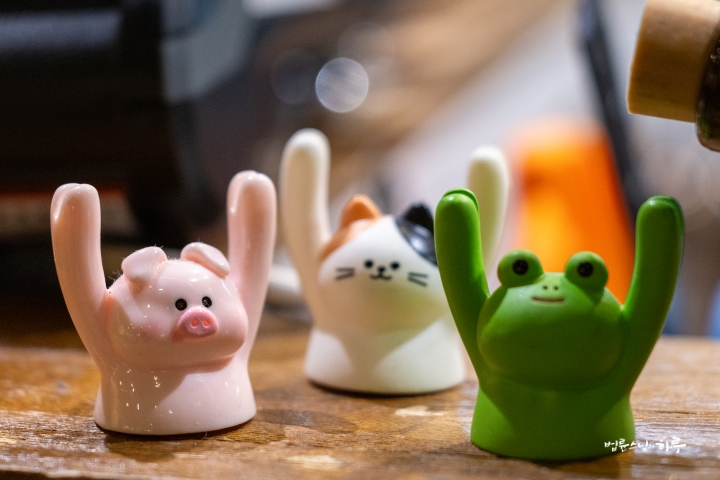
This Asia tour was modestly conducted in only four cities: Singapore, Ho Chi Minh City, Hong Kong, and Taipei. Since the tour schedule wasn’t very long, Sunim managed to complete the lecture schedule relatively smoothly despite not being in good health.
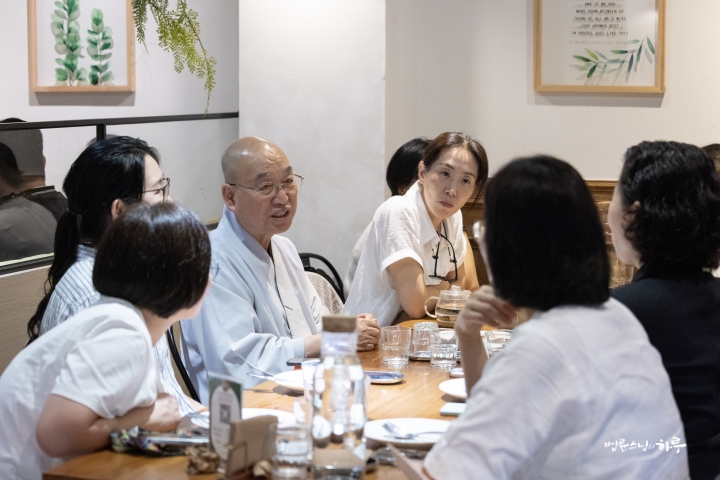
Each person casually shared their thoughts from the lecture preparation process. First, Jo Jung-eun, who serves as the Asia branch president of Jungto Society, gave an overall evaluation.
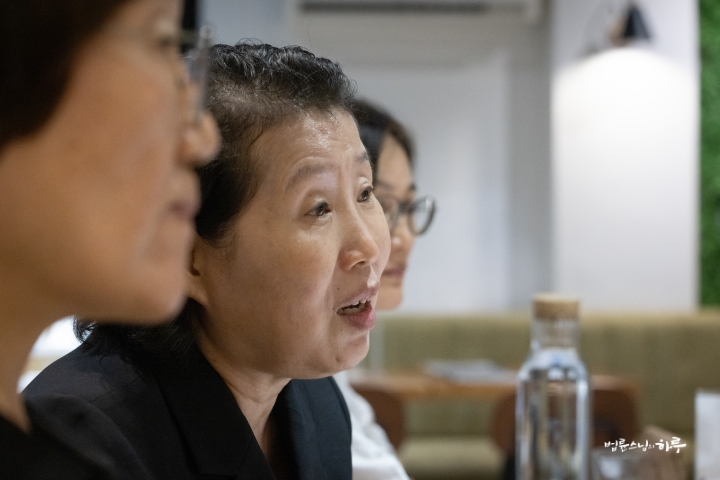
“In Asia, July is vacation time for international schools, so most people had returned to Korea, making it difficult to recruit participants. So I think it would be better to avoid July next year and hold lectures in June or September instead. Especially Hong Kong and Taiwan, despite having almost no Jungto Society members, prepared for the lectures enthusiastically. Most importantly, since those who volunteered have become more interested in practice, it would be good to guide them to the online Jungto Dharma School.”
Yang Eun-mi, who coordinated the Taiwan lecture, suggested trying lectures with local language interpretation in places where not many Korean expatriates live.
“These days, with the hot interest in K-pop, K-dramas, and K-culture, there are really many people learning Korean locally. Since the number of Korean expatriates in Taiwan is too small, I thought we could recruit many participants if we held Chinese interpretation lectures instead.”
After listening to the evaluations and suggestions, Sunim also shared his opinion.
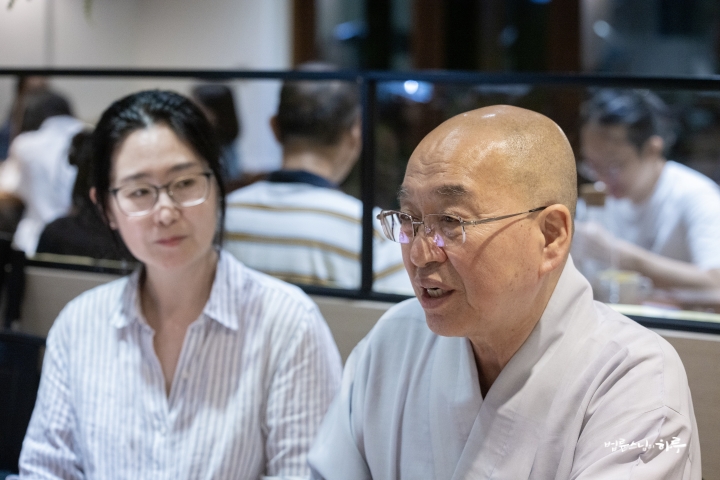
“If you want to hold local language interpretation lectures, you can schedule one more interpretation lecture during the day and have a Korean expatriate lecture in the evening. If Korean expatriates are mixed in interpretation lectures, they laugh first before Sunim’s words are interpreted, which isn’t good for the locals. That’s why we need to schedule interpretation lectures separately for locals only. In San Francisco and Minneapolis, where almost no Korean expatriates live, we only hold English interpretation lectures.
The cities in Asia where we couldn’t hold lectures this time are Hanoi, Bangkok, Kuala Lumpur, and Phnom Penh. We’re planning to hold lectures in Manila and Jakarta in the second half of the year. Then next year, we’ll adjust the lecture timing as suggested. And rather than holding lectures in every city every year, let’s adjust to once every two years. Thank you all for your hard work.”
The meeting ended at 8 PM as the day came to a close. Returning to the accommodation, Sunim finished the day’s activities after proofreading manuscripts and handling work.
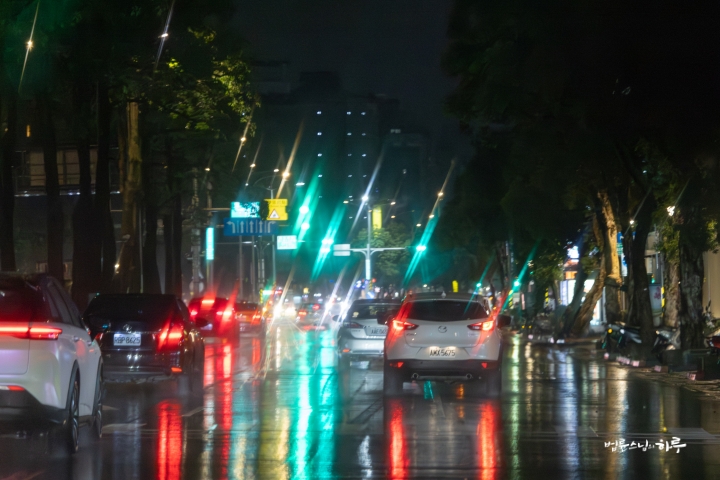
Tomorrow, after meeting with a Taiwanese scholar who has a long relationship with Sunim, he will move to the airport and depart Taiwan at 7 PM, arriving at Korea’s Incheon Airport at 11 PM local time.





